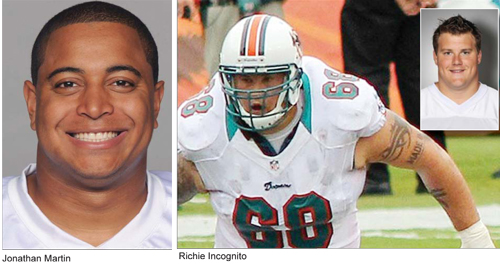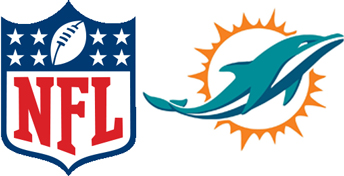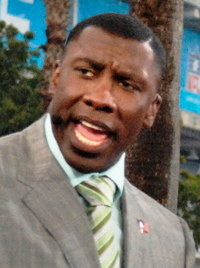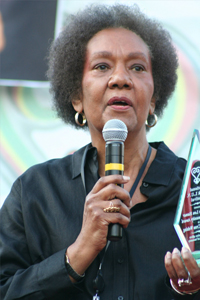
(FinalCall.com) – Voicemail rants and e-mails directed at a Black player for the Miami Dolphins opened Pandora’s Box on an ugly side of life inside the $35 billion industry known as the National Football League.
Second-year offensive lineman Jonathan Martin left the team saying he could no longer tolerate bullying that included racial slurs handed out by a teammate. “Jonathan Martin’s toughness is not at issue,” attorney David Cornwell told the media about his client. “Jonathan endured harassment that went far beyond the traditional locker room hazing.”

Richie Incognito, a fellow lineman was named chief tormentor, and admitted to using the n-word and other offensive language with Mr. Martin. He also said he would apologize to Mr. Martin’s family because his words were not meant to be malicious–but he denied being a racist.
In a Nov. 10 interview with Fox Sports, Mr. Incognito denied knowing he had hurt his “friend,” and teammate and said his behavior, while vulgar and even over the top at times, came from a place of “love.” “Incognito also turned over his phone records, which showed 1,142 texts between him and Martin in the past year. Martin sent these two texts to Incognito three days after he left the team: ‘Wassup man? The world’s gone crazy lol I’m good tho congrats on the win’, Fox Sports reported.

“ ‘Yeah I’m good man. It’s insane bro but just know I don’t blame you guys at all it’s just the culture around football and the locker room got to me a little.’ ”
Mr. Incognito said what happened is part of NFL locker room culture.
“No matter how bad or how vulgar it seems, that’s how we communicate, that’s how our friendship was,” Mr. Incognito said. He was suspended by the Dolphins as the public controversy exploded.
At Final Call presstime, Mr. Martin’s lawyer said his client would respond soon to the version of events put forward by Mr. Incognito.
Locker room culture and cultural limits
“The public at large seems surprised by the behavior of Mr. Incognito but clearly many current and former players are not. Players seem to acknowledge-accept that type of racist, barbaric behavior as commonplace in the ‘culture’ of the NFL,” said Dr. Johnny C. Benjamin, who wrote “Racism in the NFL is Not Limited to Black Guys” that was published by huffingtonpost.com.
“I fear this ‘culture’ of degrading human dignity seems endemic to the NFL and is not merely an isolated occurrence,” Dr. Benjamin told The Final Call in an e-mail. He is chairman of the Department of Orthopedic Surgery at Indian River Medical center in Miami, Fla.
Mr. Incognito, known around the league as a tough guy, has a dubious history: On Nov. 8 reports emerged that Mr. Incognito allegedly harassed a Black woman who was volunteering at a golf outing in 2012 in Miami. According to the stories, a police report revealed that he touched her private parts with a golf club and emptied bottles of water in her face.
The NFL and the NFL Players Association are investigating the alleged incidents.
According to reports from Sunday Night Football on NBC, the league plans to make the findings public and the initial probe should be finished in early December.
While Mr. Incognito and some teammates played down the racial epithet hurled at Mr. Martin, who is of mixed race parentage, others weren’t so forgiving.
A Black sports reporter in New York City, texted The Final Call under a condition of anonymity Nov. 6, saying some Black players in the Dolphins organization were telling reporters Mr. Incognito was “one of their brothers” and was allowed to use the n-word.
Former NFL star Shannon Sharpe condemned use of the n-word and any tolerance among Black players for its use. The slur is so offensive and Blacks have fought so hard for dignity, there is no honorary Black status, he added.
If Mr. Incognito used that slur toward Mr. Martin it also applied to all Blacks in the lockerroom he said in a CBS Sports segment.
“I think Richie Incognito is a racist. I think he is a bigot. I think he is a bully,” said Tom Jackson, a Black former NFL player and television sports analyst.
Hinds Ward, a former Pittsburgh Steeler turned sports analyst who is of mixed race, declared the n-word was off-limits for White players in his day. Speaking Nov. 10 on Sunday Night Football, Mr. Ward said he suffered from racial animus growing up. Black players may have used the word as a cultural expression, but it was clearly off-limits for Whites, he said.
“It is a different world in a football locker room,” commented Nasser Muhammad, who played college football at a West Virginia Division II college. He coaches basketball at a Washington, D.C. charter school where he teaches and is looking forward to coaching football.
A football player since age 9, Mr. Muhammad conceded a culture of hazing exists in the sport. He drew the line at the n-word. “I let it be known in college that I would not tolerate anyone directing the n-word towards me, but some of the Black players seemed comfortable with it because it was used at their high schools,” said Mr. Muhammad, who is also the son of Final Call staffer Nisa Islam Muhammad.
A happy dysfunctional NFL family?
Some say behavior revealed in the Miami locker room–alleged instances of racial abuse, forcing rookie players to pay for trips and dinners and little involvement of the coaching staff–is indicative of a greater culture inside the NFL. Racial prejudice and racial stereotyping remain embedded in the league’s fabric, they say.
“We are at a point in this society in which we have made a certain amount of progress eradicating some barriers in politics, education and sports,” said Dr. Charles Ross chairman of African American Studies and associate professor of history at the University of Mississippi and author of the 1999 book “Outside the Lines: African Americans and the Integration of the NFL.”
The NFL is a “complex” world for Black players, said Dr. Ross. These players still have to make sure they fit in with the expectations of team owners and team culture, which demands a loyalty and often silence on important issues, like race, he explained.
“When I wrote about how the league looked in 1962 and what I see now with 70 percent of the NFL players being Black, it clearly represents a new dynamic for White players who have to change their perceptions of Black players,” said Dr. Ross. So White players exhibit a tacit acceptance of Black subculture through language, end zone celebrations and even use of the n-word, he added.
But, he and other analysts said, true power often still resides with Whites in the locker room and Whites who control football operations.
These analysts note from the early days of the league, Black players struggled with race but kept their mouths shut for fear of being labeled “troublemakers.”

Dr. Frances Cress Welsing, a respected Washington, D.C.-based psychiatrist and author, told The Final Call a willingness among some Black players to give White counterparts a free pass with the n-word was troubling.
“Black players have been taught and conditioned to accept the abuse implied by the use of the word by Whites,” she said. “I believe that the young man, Jonathan Martin, has not been taught by his parents the meaning of ‘White supremacy.’
“Can you imagine the outcry if Black players referred to Whites as ‘albino mutants?’ ” Dr. Welsing asked. “It is the illusion of inclusion, wanting to believe that we are accepted; but the system only means for us to demean and disrespect ourselves, thinking it is entertainment.”
“White people are being prepared to accept the coming genocide of Black people,” she said.
For a long time the lack of Blacks as quarterbacks, centers, offensive lineman, kickers, punters, long-snappers, and tight ends was seen as an issue. Black quarterbacks have broken through substantial on-field barriers and opportunities for Black coaches have increased as well.
But some have raised questions about disparity in salaries and scrutiny of Black players versus their White counterparts.
The ending to this saga, however, will largely be written by NFL owners, who remain largely White, male and rich. They surely don’t want anything to taint their billion-dollar product.
These owners, who often include billionaires, want to see every seat in cavernous stadiums filled. Forbes magazine in 2011 reported that 15 owners of the 32 NFL franchises had a net worth of $1 billion. According to the Center for Responsive Politics, the owners are also heavy financial supporters of the Republican Party.
“At the end of the day, all of these owners only care about winning,” said Howie Evans, sports editor for the Black weekly Amsterdam News. Winning brings more money and more opportunities to make money so owners are likely to defuse anything that could impact green, which may be the color the NFL covets most.
Related news:
‘Massa’ David Stern & the NBA ‘Plantation’ (FCN, 10-28-2011)












